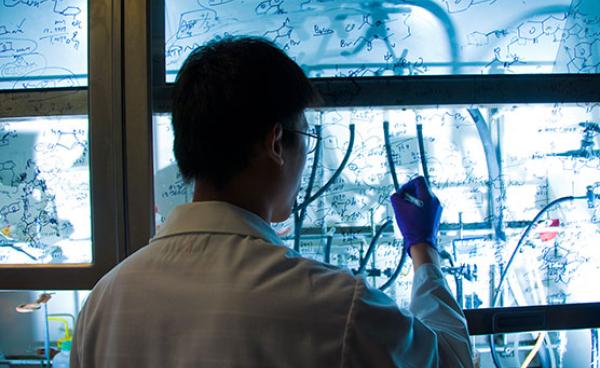Medical Oncology Research Activities

The Department of Medical Oncology oversees more than 80 independent laboratories, with wide-ranging interests from basic mechanisms of cancer progression to outcomes analysis of cancer interventions of all types. Medical Oncology research is fostered within an extraordinary intellectual and scientific environment, and leverages the combined experiences and resources of Dana-Farber, the Dana-Farber/Harvard Cancer Center, Harvard Medical School, and the Broad Institute of MIT and Harvard, among others. Investigators are highly collaborative, both within Dana-Farber and more broadly. Shared resources, both material and intellectual, within Dana-Farber and across collaborating institutions, accelerate the pace of discovery.
Medical Oncology Research Divisions

Hematologic Neoplasia
Chief: Margaret Shipp, MD

Molecular and Cellular Oncology
Chief: James DeCaprio, MD

Population Sciences
Chief: Eliezer Van Allen, MD
Clinical Research Centers Led by Medical Oncology Faculty
Centers include:
- Robert and Renée Belfer Center for Applied Cancer Science
- Cancer Care Equity Program (CCEP)
- Center for BRCA and Related Genes
- Center for Cancer Genomics (CCG)
- Center for Cancer Therapeutic Innovation
- Center for Community-Based Research
- Center for DNA Damage and Repair (CCDR)
- Centers for Early Detection and Interception (CEDI)
- Center for Global Health Equity
- Center for Functional Cancer Epigenetics (CFCE)
- Center for Immuno-Oncology
- Center for Patient Derived Models
- Chen-Huang Center for EGFR-Mutant Lung Cancers
- Connell and O'Reilly Families Cell Manipulation Core Facility (CMCF)
- Hale Family Center for Pancreatic Cancer Research
- Arthur and Linda Gelb Center for Translational Research
- McGraw/Patterson Center for Population Sciences
- Merkel Cell Carcinoma (MCC) Center of Excellence
- Perini Family Survivors' Center
- Phyllis F. Cantor Center for Research in Nursing and Patient Care Services
Recent Advances and Accomplishments by Medical Oncology Faculty
Some notable basic research investigations and discoveries include:
- Discovery of how cells sense and adapt to oxygen availability – Nobel Prize in Medicine 2019 (William Kaelin Jr., MD).
- Discovery that the state of mitochondrial priming for apoptosis can be used as a predictive test for sensitivity to chemotherapy in acute myeloid leukemia and other myeloid malignancies (Anthony Letai, MD, PhD).
- Pangenomic characterization of adrenocortical carcinoma (Matthew Meyerson, MD, PhD).
- Characterization of phenotypic variants of Li Fraumeni syndrome, an inherited cancer susceptibility gene (Judy Garber, MD, MPH, and Huma Rana, MD).
- Discovery of DNA repair gene mutations in a subset of men with prostate cancers (Mark Pomerantz, MD, and others).
- Studies on subclonal evolution and the role of splicing factor mutations in Chronic Lymphocytic Leukemia (Catherine Wu, MD).
- Identification of common germline risk mechanisms for breast, prostate, and ovarian cancers that operate through gene expression and alternative DNA splicing (Alexander Gusev, PhD).
- Discovery of mutations in MYD88 as the cause of Waldenström's macroglobulinemia and development of the BTK inhibitor ibrutinib as a highly effective therapy for this disease (Steven Treon, MD, PhD).
- Characterization of genetic and environmental causes of breast, endometrial and ovarian cancers in multi-ethnic international cohort studies; and molecular differences in prostate cancers and differences in incidence and mortality in men of African descent in North America, the Caribbean, and Africa (Tim Rebbeck, MD, MPH).
- Studies with genetically engineered mouse models (GEMM) of lung cancer, identifying multiple new therapeutic strategies, including CDK7 inhibitors (Pasi Jänne, MD, PhD, and others).
- Demonstration of extensive reprogramming of the androgen receptor cistrome in prostate cancer (Matthew Freedman, MD).
- Discovery of a new preleukemic disorder, clonal hematopoiesis of indeterminate potential (CHIP), marked by the steady accumulation of mutations characteristic of leukemia in otherwise normal individuals (Benjamin Ebert, MD, PhD).
Recent departmental accomplishments include:
- Multiple Specialized Programs of Research Excellence (SPORE) grants for research programs in myeloid malignancies, prostate cancer, kidney cancer, multiple myeloma, breast cancer, and gastrointestinal cancer, as well as translational program project grants in immunogenicity, leukemia, multiple myeloma, prostate cancer, and lung cancer.
- Large Stand Up to Cancer grants for research in multiple myeloma, lung cancer, ovarian cancer, and pancreatic cancer interception. Recent grants to support sequencing and analysis of human tumor specimens have also been funded.
- Establishment and development of a novel Immuno-Oncology Center, which coordinates clinical research across tumor types, including clinical trials involving immunotherapy agents such as checkpoint inhibitors of CTLA4 and PDL1. This center has led several immunotherapy trials with high impact, and currently leads more than 28 clinical trials testing novel immunological therapies.
- Development and implementation of the Immuno-Oncology Investigator Training Program, designed to facilitate research involving immunotherapies by developing the next generation of leaders in immuno-oncology, and by increasing the number of investigators with expertise in immuno-oncology.
- Development and implementation of multiple technology solutions to optimize cancer diagnosis, prognosis, and practice, to aid in health care management and regulation, and to track patient response and inform clinical research and cancer care delivery innovation at scale.
- Multiple studies on the mechanisms of resistance to ALK and EGFR inhibitors in lung cancer and strategies to avert and bypass resistance mechanisms (Pasi Jänne, MD, PhD, Bruce Johnson, MD, and others).
Major advances in the care of cancer patients over the last decade have resulted in a significant decline in cancer death rates over the last few years. Members of the department have contributed significantly to these advances through clinical trials some of which include:
- Enrollment of more than 3,900 patients across DF/HCC annually in therapeutic trials, and more than 9,400 patients annually in non-therapeutic clinical trials.
- Expansion of the outpatient Clinical Research Center in the Yawkey Center for Cancer Care, with 24 infusion beds dedicated to Phase I and II therapeutic clinical trials.
- Development and implementation of a training program for clinical investigators, specifically aimed at junior faculty and senior fellows, as well as improved infrastructure to support clinical trial research.
- Development and implementation of a Research Nurse Training Program and Internship Program, and a newly-licensed Research Nurse Residency Program.
- Clinical trials testing BCL2 blocking drug and BH3 mimetics have leading to FDA approval of Venetoclax for certain forms of chronic lymphocytic lymphoma (CLL), small lymphocytic lymphoma (SLL), and in combination with chemotherapy, acute myeloid leukemia (AML) (Anthony Letai, MD, PhD).
- Multiple clinical studies showing the remarkable potential of anti-PD1 and anti-PDL1 antibodies for immunotherapy of patients with cancer, and the extension of immunotherapy to new cellular and microenvironmental targets (F. Stephen Hodi, MD, Gordon Freeman, MD, Philippe Armand, MD, PhD, and Margaret Shipp, MD).
- Co-development of MatchMiner, a system to match patients to clinical trials by integrating molecular tumor profiles (Michael Hassett, MD, PhD).
- Further development and trials of highly effective combination therapy for myeloma involving thalidomide derivatives and bortezomib, with numerous studies currently testing new generations of proteasome inhibitors, HDAC inhibitors, and immune therapies (Kenneth Anderson, MD, and Paul Richardson, MD).
- Development and testing of new cancer vaccine strategies, particularly in the areas of antigen presentation and adjuvants (Catherine Wu, MD, Patrick Ott, MD, PhD).
- Advancement in the adjuvant treatment of small, HER2-positive breast cancers with paclitaxel and trastuzumab (Sara Tolaney, MD, MPH, Eric Winer, MD).
- Development of successful new small-molecule drugs for chronic lymphocytic leukemia (Jennifer Brown, MD, PhD, Matthew Davids, MD, MMSc, Catherine Wu, MD).
- Identification of the mechanisms underlying the association between poverty and established contexts where genomic tumor profiling using panel tests such as Oncotype DX is cost-effective in breast cancer (Rinaa Punglia, MD, MPH).
- Demonstration that the combination of biometric trackers and mobile symptom reporting prevents clinical deterioration and improves well-being in patients with advanced gynecological cancer (Alexi Wright, MD, MPH).
- Development of genotyping tests for solid and liquid tumors, focusing on actionable mutations. More than 103,000 patients have signed informed consents since 2014. In 2018, approximately 3,900 solid tumors and 3,000 liquid tumors were tested; in total, approximately 22,900 solid tumors and 10,000 liquid tumors have been tested.
- Establishment of the influence of physician communication styles on parent’s coping with a child’s cancer diagnosis (Jennifer Mack, MD, MPH)
- Demonstration of the impact of tailored communication strategies to decrease cancer risk (Vish Viswanath, PhD).
- Development of videos and communication tools to improve prognostic understanding and chemotherapy teaching; and developed mobile technology solutions to optimize pain management for cancer patients (Andrea Enzinger, MD, MPH).
- Co-development of the PRO-CTCAE system for ascertaining symptom toxicity and adverse events directly from patients and integration into EPIC to enable the availability of patient-reported symptom toxicities at the point of care. This is a validated national standard recognized by the FDA for use in regulatory decisions. (Michael Hassett, MD, MPH).
- Development of approaches to provide pre- and post-test counseling for individuals undergoing germline cancer susceptibility testing at scale using telehealth (Judy Garber MD, MPH, Huma Rana MD, and Sapna Syngal, MD, MPH).
- Development and implementation of the PREMM5 tool for identifying Lynch syndrome that is a national standard integrated into practice guidelines (Matt Yurgelun, MD, Sapna Syngal, MD, MPH).
- Systematic germline cancer susceptibility testing using multi-gene panels integrated into routine care workflow across Dana-Farber (Judy Garber, MD, MPH).
- Clinical OncoPanel (solid tumor testing) results, typically available within two weeks. Results of the Rapid Heme Panel available to patients in about four days; this test has transformed decision-making in many types of hematologic malignancies.
- Characterization of the association between poverty and survival outcomes in pediatric cancer and the mechanisms underlying these associations (Kira Bona, MD, MPH).
- Development of work site interventions to decrease cancer risk factors for low-wage workers in the food services industry and to decrease tobacco use in India (Glorian Sorensen, PhD, MPH).
- Development of an ethical framework for considering allocation of scarce resource-intensive cellular therapies such as CAR-T cell treatments (Gregory Abel MD, MPH).
- Development of supportive care interventions to improve quality of life and end of life decision making for patients with hematologic malignancies (Oreofe Odejide, MD, MPH).
- Characterization of the association between weight, physical activity and the risk of multiple myeloma (Catherine Marinac, PhD).
Related Links
Dana-Farber averages more than 1,100 clinical trials at any given time. Learn more about clinical trials at Dana-Farber.
Learn about our department's clinical activities.